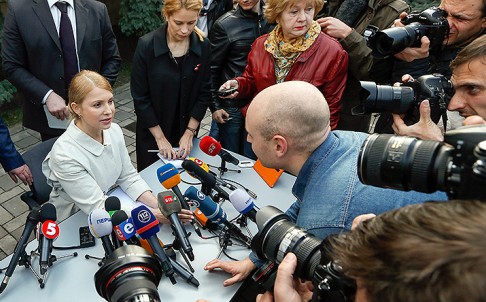IMF throws Ukraine US$27b financial lifeline in return for tough economic reforms
Deal rushed through in return for tough economic reforms that would unlock further aid from the EU and US over two years
PUBLISHED : Thursday, 27 March, 2014, 11:01pm
UPDATED : Thursday, 27 March, 2014, 11:01pm
Reuters in Kiev and Moscow

Ukrainian opposition politician Yulia Tymoshenko speaks at a in Kiev. Photo: EPA
Ukraine won a US$27-billion international financial lifeline yesterday, rushed through in the wake of Russia's annexation of Crimea, as Moscow's economy minister spoke of the cost of military action in its former Soviet neighbour.
The International Monetary Fund announced agreement on a US$14-18 billion standby credit for Kiev in return for tough economic reforms that would unlock further aid from the European Union, the United States and other lenders over two years.
The IMF deal was a political boost for the pro-Western government that replaced ousted Russian-backed President Viktor Yanukovich last month, prompting Moscow to seize the Black Sea peninsula.
"The financial support from the broader international community that the programme will unlock amounts to US$27 billion over the next two years," the IMF said.
The Ukraine crisis has triggered the most serious East-West confrontation since the end of the cold war, deepening the slump in Ukraine's battered economy.
Without IMF-mandated austerity measures, the economy could contract by up to 10 per cent this year, Prime Minister Arseny Yatseniuk told parliament, explaining why his government had bowed to the fund's conditions. "Ukraine is on the edge of economic and financial bankruptcy," he said.
Kiev opened the way for the IMF deal by announcing on Wednesday a radical 50 per rise cent in the price of domestic gas from May 1 and promising to phase out remaining energy subsidies by 2016, an unpopular step Yanukovich had refused to take.
It also accepted a flexible exchange rate that is fuelling inflation, set to hit 12-14 per cent this year.
The prime minister, who took on the job a month ago saying his government was on a "kamikaze" mission to take painful decisions, said the price of Russian gas on which the nation depended might rise 79 per cent - a recipe for popular discontent.
The IMF said a key element of the programme would focus on cleaning up Ukraine's opaque energy giant Naftogaz, which imports gas from Russia's Gazprom. Naftogaz's chief executive was arrested last week in a corruption probe.
"The programme will focus on improving the transparency of Naftogaz's accounts and restructuring of the company to reduce its costs and raise efficiency," it said.
The White House said the IMF deal "represents a powerful sign of support from the international community for the Ukrainian government".
The international rescue for Ukraine was in sharp contrast to Western measures to isolate Russia diplomatically and charge it an economic price for the annexation of Crimea, home to Moscow's Black Sea fleet and a majority of ethnic Russians.
Targeted US and EU visa bans and asset freezes against senior Russian and Crimean officials, with the threat of tougher economic sanctions to come if President Vladimir Putin goes any further, have accelerated capital flight.
Russian Economy Minister Alexei Ulyukayev said yesterday capital outflow could be US$100 billion this year, and would slow economic growth to about 0.6 per cent.
The World Bank gave a gloomier forecast, saying that in a high-risk scenario of persistent tension over Ukraine, Moscow's economy could shrink by up to 1.8 per cent, even without Western trade sanctions.
